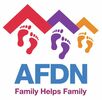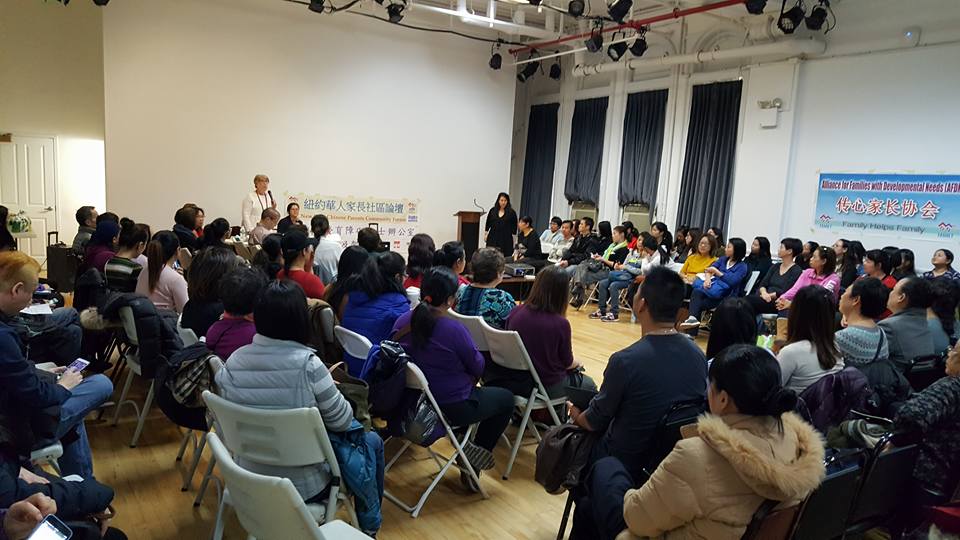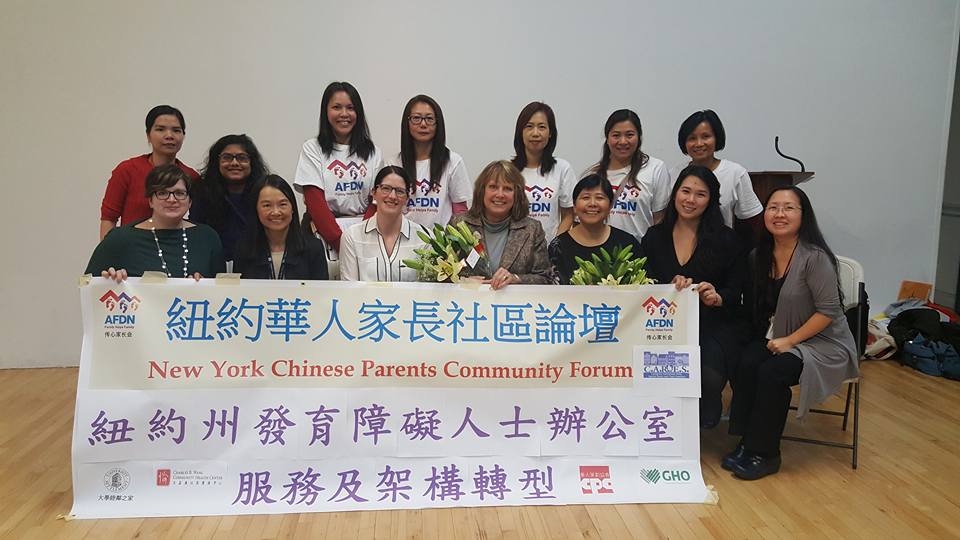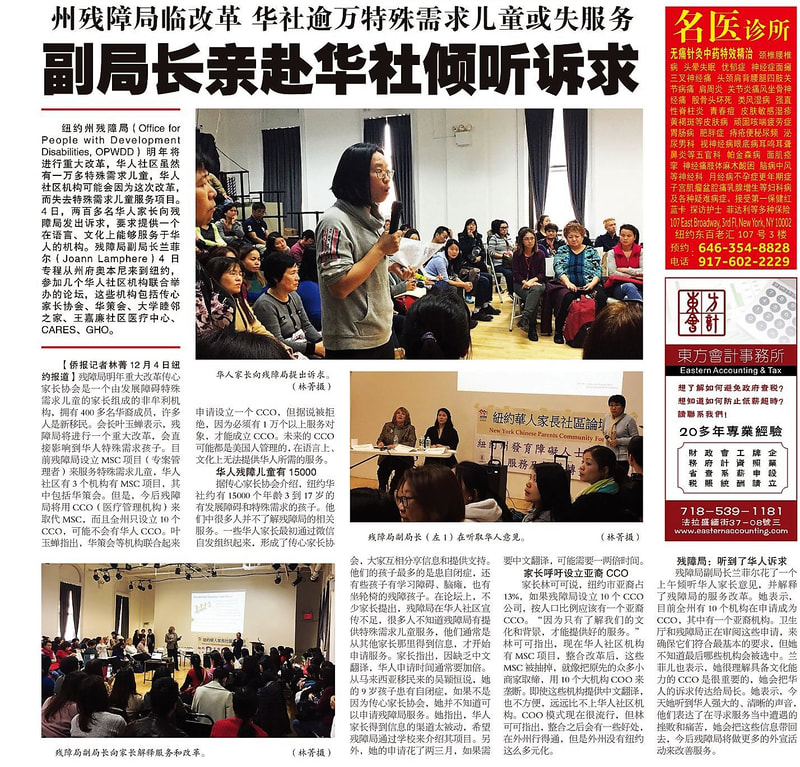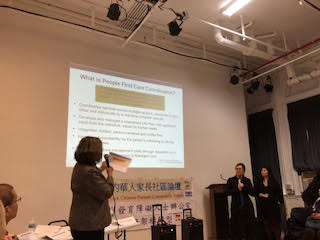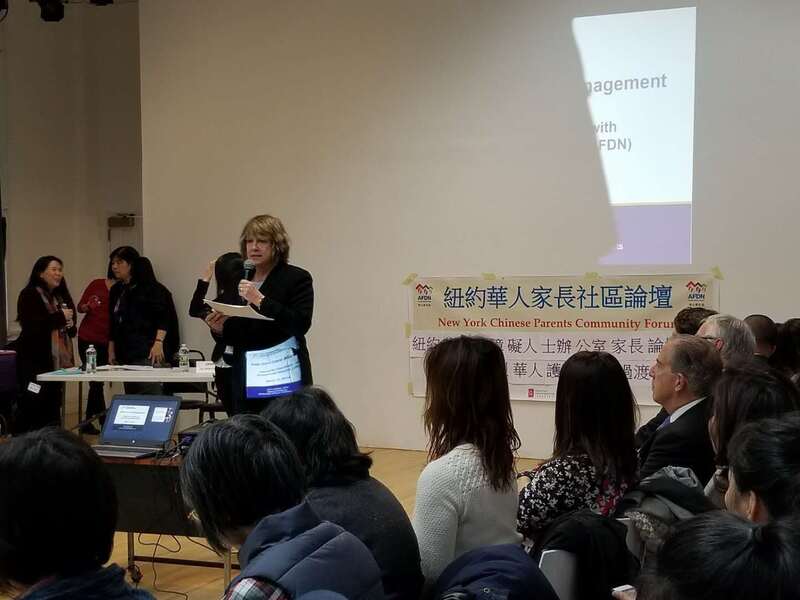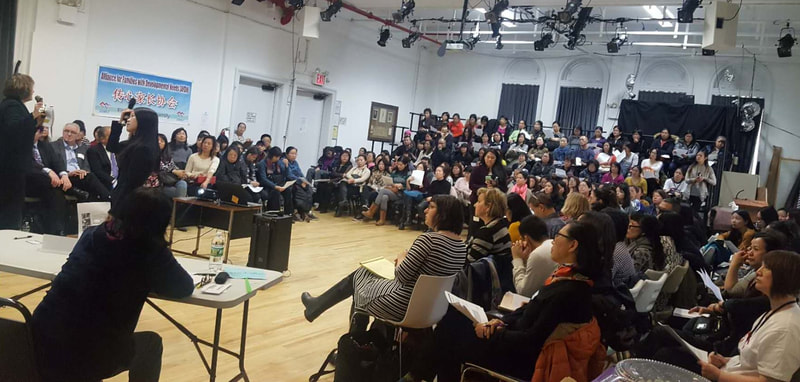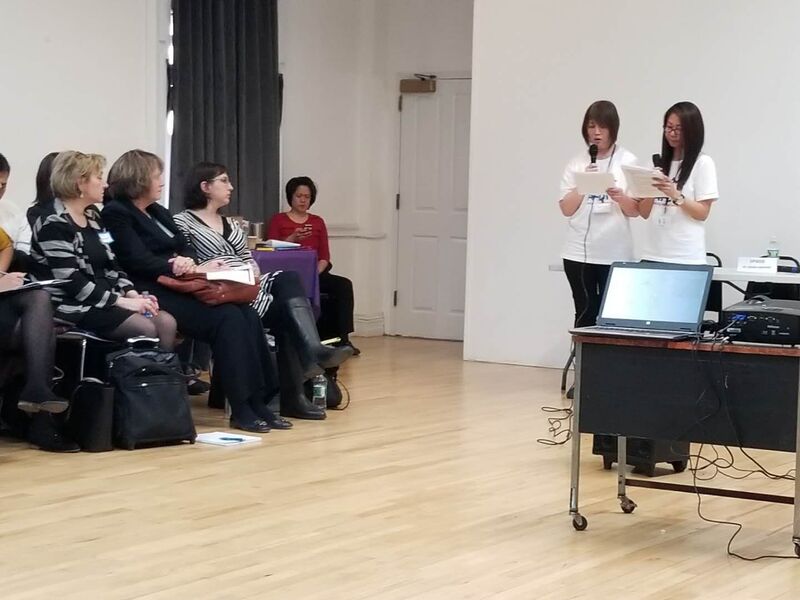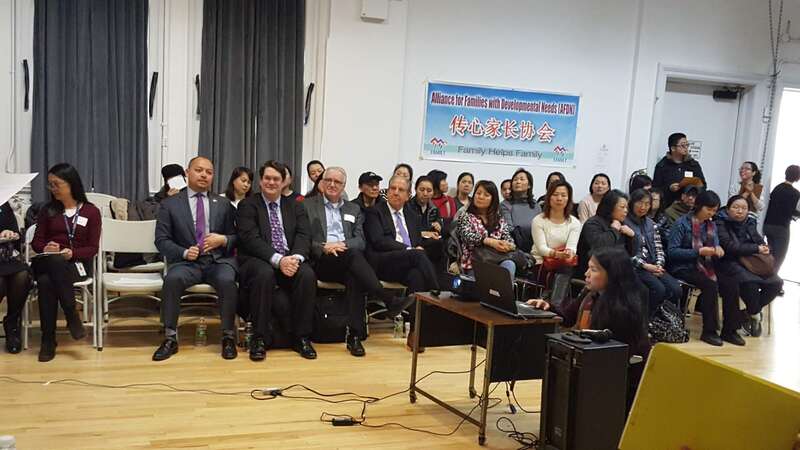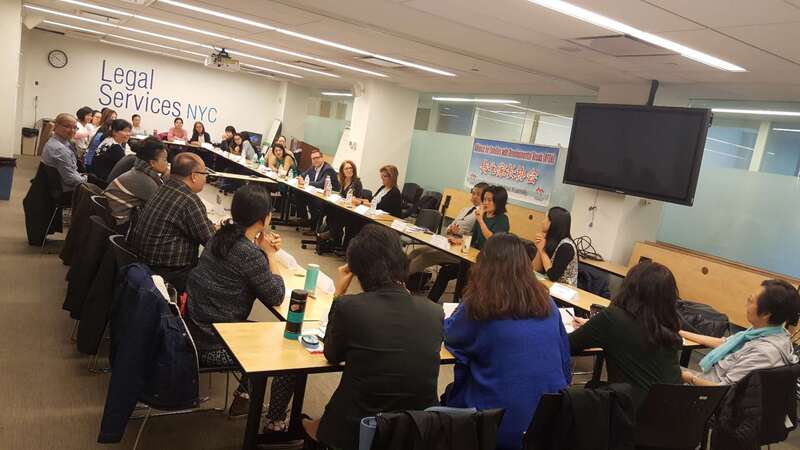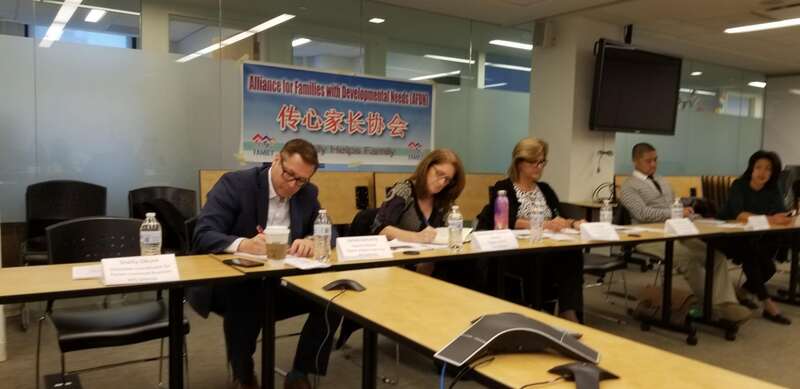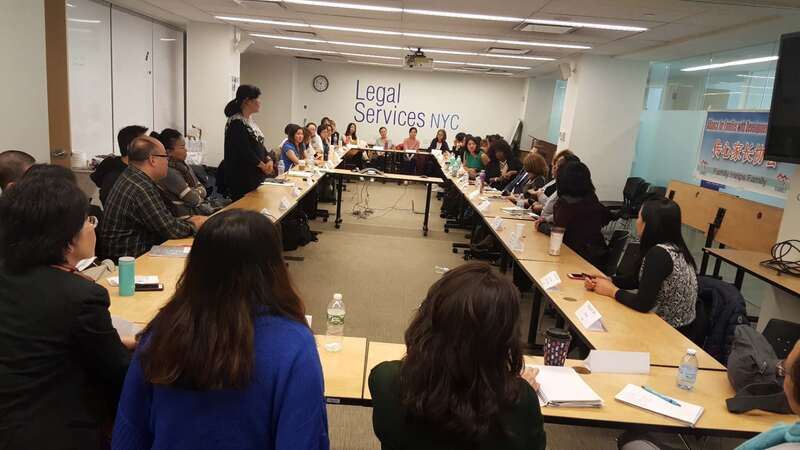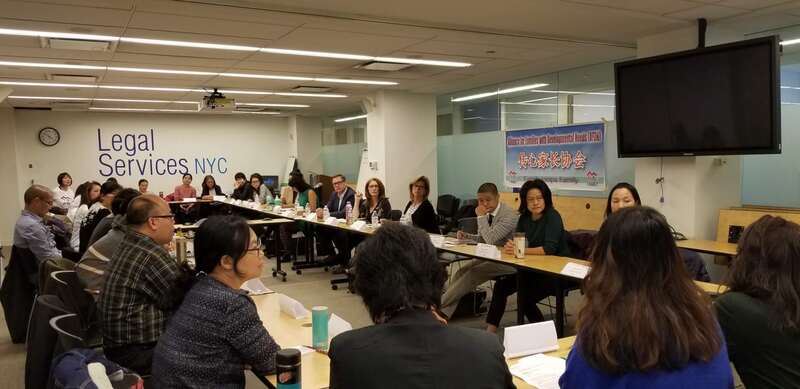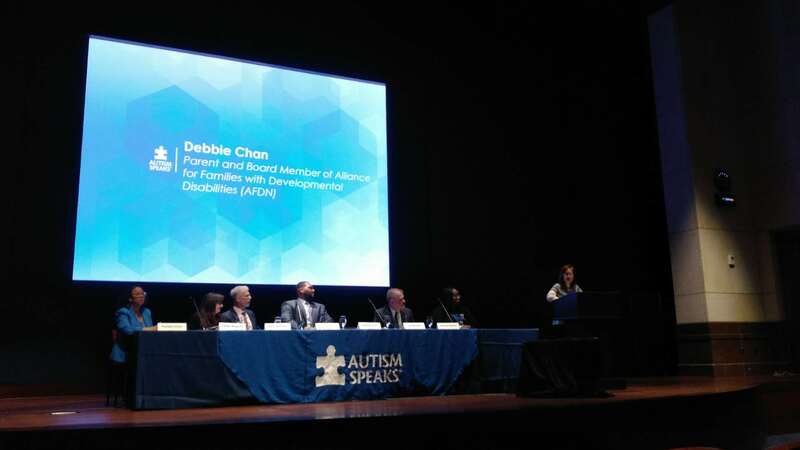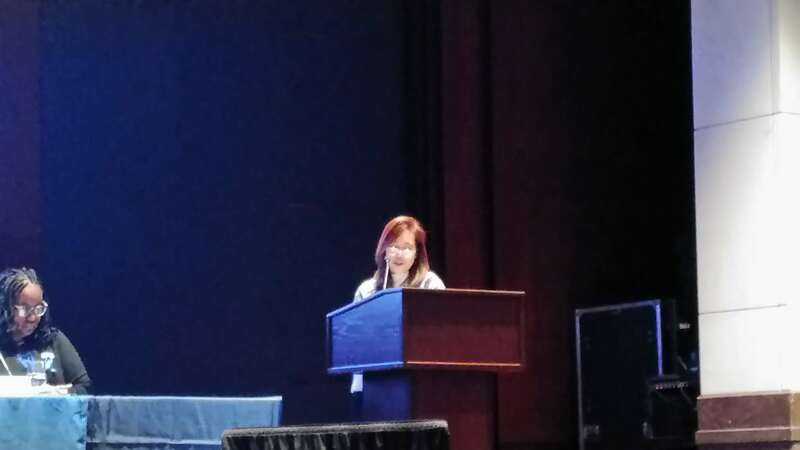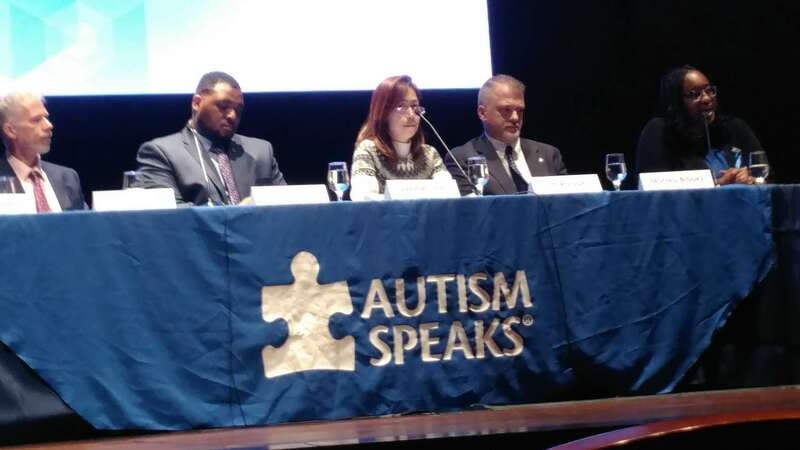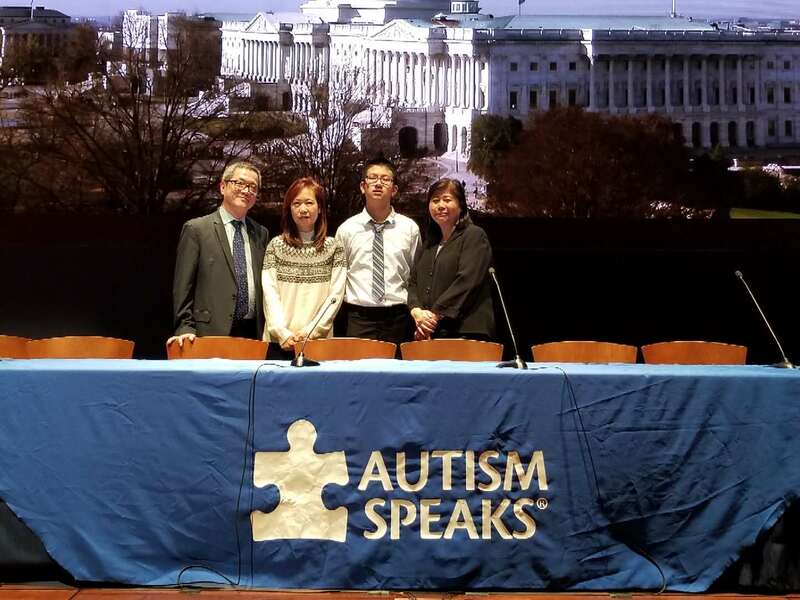ADVOCACY & COMMUNITY INVOLVEMENT
New York Chinese Parents Community Forum
OPWDD Services & Transition to Care Coordination Organizations(CCOs) I & II
Forum I : December 4 2017
| |||||||
| opwdd_forum_i_report.docx | |
| File Size: | 7815 kb |
| File Type: | docx |
Presenters:
Dr. JoAnn Lamphere, Deputy Commissioner,
Division of Person Centered Support at OPWDD
Ellen Bleckman, Community Service Administrator (CSA) at OPWDD
Dr. JoAnn Lamphere, Deputy Commissioner,
Division of Person Centered Support at OPWDD
Ellen Bleckman, Community Service Administrator (CSA) at OPWDD
Forum II: March 12, 2018
| |||||||
| opwdd_forum_ii_report_052818.docx | |
| File Size: | 5742 kb |
| File Type: | docx |
Presenters:
Dr. JoAnn Lamphere, Deputy Commissioner,
Division of Person Centered Support at OPWDD
Dianne Henk, Director of Workforce Transformation, OPWDD
Hirah Mir, Project Assistant in Workforce Transformation, OPWDD
Dr. JoAnn Lamphere, Deputy Commissioner,
Division of Person Centered Support at OPWDD
Dianne Henk, Director of Workforce Transformation, OPWDD
Hirah Mir, Project Assistant in Workforce Transformation, OPWDD
OPWDD 與華裔社區代表季度會議
OPWDD-Chinese I/DD Community Workgroup Quarterly Meeting
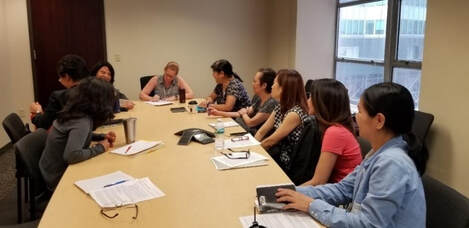
從2019年初開始,華裔社區代表與OPWDD纽约市地区主管Mary Grace Giuliano開始了每三個月一次的工作會議,讨论有關华裔特殊需要家庭接受服務過程中遇到的问题,并督促OPWDD訂定和推进解决方案。
華裔社區代表小組是由OPWDD邀請傳心家長協會組成的。組內成員包括來自傳心及社區家長代表,並在社區內有服務特殊需要人士及家庭經驗豐富的前線工作人員。
[會議詳細內容請參閱傳心季刋第二期]
華裔社區代表小組是由OPWDD邀請傳心家長協會組成的。組內成員包括來自傳心及社區家長代表,並在社區內有服務特殊需要人士及家庭經驗豐富的前線工作人員。
[會議詳細內容請參閱傳心季刋第二期]
Autism and Disparities: Addressing the Needs of Underserved Communities
Hosted in coordination with the Congressional Coalition on Autism Research on Education
Autism Speaks Congressional Briefing 2019 - live streaming video
|
Health disparities among children with Autism Spectrum Disorder from the Chinese immigrant community
Debbie Chan – Parent and Board Member, AFDN
Good morning, my name is Debbie Chan from NY City. I have a 16 years old autistic son. I am also a board member of Alliance Families with Developmental Needs which is the first and only one NY State incorporated not-for -profit organization formed by Chinese parents having children with autism and related developmental disabilities. Right now, we maintain a social media network of over 450 parents who live in 5 boroughs of NYC. The parents of our network are mostly monolingual and from low-income family having either public or private insurance, low education level. In addition to the factors, strong social stigma in our community attributed to health disparities.
Due to the low education and social stigma, many parents feel shame and try to hide their kids that greatly delay seeking assessment, early intervention and special education. In our community language access is a big problem, lack of translators delays the assessment and services to autistic kids because the specialist qualified and bilingual to do assessment is very limited. That greatly delay timing ASD diagnosis and start services. On the other side, our parents having difficulties in navigating the complex US health care delivery system. For language and communication reasons, parents tend to choose the private Chinese clinics but many Chinese private clinics don't take straight Medicaid. Then they have to go the services in mainstream. In the mainstream, severely inadequate culturally and linguistically competent and bilingual specialist and front-line service workers.
People on autism spectrum have higher rates of adverse physical health outcomes, like epilepsy, gastrointestinal disorder, disrupted sleep and mental health condition. The heightened adverse physical health outcomes may be partially explained by known health risk factors, including poor eating habits, fastidious diet, limited physical activity, obesity and long-term psychotropic medication use. Moreover, the ASD features of the child affecting interactions with healthcare professionals and obtain appropriate treatment. The people of autism spectrum mostly have the problems with communication. Most of them are non-verbal or limited speech. They cannot tell the doctors what problems they have or how they feel. One of our parent member told us that her child cried and screamed for more than one week. However, the pediatrician could not find the reasons. Another is sensory problem. People of autism spectrum are very sensitive to touch that lead to the problems of interaction with healthcare professionals, particularly dentist. We need more specially trained healthcare professionals to provide care but unfortunately the number of such kind of professionals is still very limited.
Thank You very much!
For more information:
https://www.autismspeaks.org/advocacy-news/autism-disparities-addressing-needs-underserved-communities
Autism Speaks 國會簡報會Congressional Briefing 2019
Autism Speaks,一個自閉障礙倡導的全美組織,於本年4月3日,聯同 “自閉障礙教育硏究國會聯盟” [Congressional Coalition on Autism Research on Education] ,在首都華盛頓國會山莊舉辦一場國會簡報會,主題為 “自閉障礙與健康水平差距: 針對得不到充分服務的社區的需要” [Autism and Disparities: Addressing the Needs of Underserved Communities] ,傳心家長協會被邀請派員參與簡報。以下是我們的代表Debbie Chan 的發言,題目是 “華人移民社區自閉障礙兒童的健康水平差距” 。
早安。我的名字是Debbie Chan,來自紐約市。我有一個十六歲被診斷為自閉障礙的兒子。我現在是傳心家長協會的執委會委員,傳心是紐約州第一個也是唯一一個由華裔特殊發展障礙家長組成的非營利組織。現在,我們維繫一個超過450名居住在紐約市五大區的家長社交網絡平台,我們網絡內的家長大多數來自低收入低教育程度的中文單語家庭,接受政府或者在職公司保險。這些條件,加上我們社區內強烈的標籤歧視,造成自閉障礙兒童的健康水平差距。
由於低教育程度及社會標籤歧視,許多家長感到羞恥,把有特殊發展障礙的孩子隱藏,延緩尋找評估、早期介入服務及特殊教育。在我們的社區裡,語言服務是一個大問題,翻譯人員不足,合資格的雙語專業人員人数有限,如此,對自閉兒的評估及服務造成嚴重的影響。另一方面,我們的家長在駕馭這複雜的美國健康醫療系統面對很大困難。因語言及溝通困難,很多家長選擇到華人社區的私家診所求診,但很多華人醫生不接受白咭。所以,很多家長必須在主流社會尋找服務。然而,在主流社區服務機構內,適應文化及語言需要的服務、雙語專業及前線服務人員嚴重缺乏。
自閉障礙天的身體健康高值負指數,常見症狀如癲癇、腸胃疾病、睡眠障礙鰻精神健康障礙等。健康高值負指數可能源於某些已知的因素,包括不良或挑剔的飲食習慣、有限的體能活動、肥胖及長期使用精神科藥物等。再者, 自閉兒的行為特徵會影響他們與健保專業人員的互動和溝通,從而影響他們獲得相應治療的機會。自閉障礙人士大多數有溝通困難, 他們的語言能力有限或完全沒有語言能力,他們沒法告訴醫生身體上的問題或感覺。我聽聞有家長的孩子哭鬧了一個星期,兒科醫生也找不到什麼原因。另一個是感官問題,自閉障礙人士對觸碰是很敏感的,這也會影響他們與健保專業人員的互動,特別是牙醫。我們需要多一些特別培訓的健保專業人員提供健康照顧。只可惜今天這方面的專才仍非常有限。
Debbie Chan – Parent and Board Member, AFDN
Good morning, my name is Debbie Chan from NY City. I have a 16 years old autistic son. I am also a board member of Alliance Families with Developmental Needs which is the first and only one NY State incorporated not-for -profit organization formed by Chinese parents having children with autism and related developmental disabilities. Right now, we maintain a social media network of over 450 parents who live in 5 boroughs of NYC. The parents of our network are mostly monolingual and from low-income family having either public or private insurance, low education level. In addition to the factors, strong social stigma in our community attributed to health disparities.
Due to the low education and social stigma, many parents feel shame and try to hide their kids that greatly delay seeking assessment, early intervention and special education. In our community language access is a big problem, lack of translators delays the assessment and services to autistic kids because the specialist qualified and bilingual to do assessment is very limited. That greatly delay timing ASD diagnosis and start services. On the other side, our parents having difficulties in navigating the complex US health care delivery system. For language and communication reasons, parents tend to choose the private Chinese clinics but many Chinese private clinics don't take straight Medicaid. Then they have to go the services in mainstream. In the mainstream, severely inadequate culturally and linguistically competent and bilingual specialist and front-line service workers.
People on autism spectrum have higher rates of adverse physical health outcomes, like epilepsy, gastrointestinal disorder, disrupted sleep and mental health condition. The heightened adverse physical health outcomes may be partially explained by known health risk factors, including poor eating habits, fastidious diet, limited physical activity, obesity and long-term psychotropic medication use. Moreover, the ASD features of the child affecting interactions with healthcare professionals and obtain appropriate treatment. The people of autism spectrum mostly have the problems with communication. Most of them are non-verbal or limited speech. They cannot tell the doctors what problems they have or how they feel. One of our parent member told us that her child cried and screamed for more than one week. However, the pediatrician could not find the reasons. Another is sensory problem. People of autism spectrum are very sensitive to touch that lead to the problems of interaction with healthcare professionals, particularly dentist. We need more specially trained healthcare professionals to provide care but unfortunately the number of such kind of professionals is still very limited.
Thank You very much!
For more information:
https://www.autismspeaks.org/advocacy-news/autism-disparities-addressing-needs-underserved-communities
Autism Speaks 國會簡報會Congressional Briefing 2019
Autism Speaks,一個自閉障礙倡導的全美組織,於本年4月3日,聯同 “自閉障礙教育硏究國會聯盟” [Congressional Coalition on Autism Research on Education] ,在首都華盛頓國會山莊舉辦一場國會簡報會,主題為 “自閉障礙與健康水平差距: 針對得不到充分服務的社區的需要” [Autism and Disparities: Addressing the Needs of Underserved Communities] ,傳心家長協會被邀請派員參與簡報。以下是我們的代表Debbie Chan 的發言,題目是 “華人移民社區自閉障礙兒童的健康水平差距” 。
早安。我的名字是Debbie Chan,來自紐約市。我有一個十六歲被診斷為自閉障礙的兒子。我現在是傳心家長協會的執委會委員,傳心是紐約州第一個也是唯一一個由華裔特殊發展障礙家長組成的非營利組織。現在,我們維繫一個超過450名居住在紐約市五大區的家長社交網絡平台,我們網絡內的家長大多數來自低收入低教育程度的中文單語家庭,接受政府或者在職公司保險。這些條件,加上我們社區內強烈的標籤歧視,造成自閉障礙兒童的健康水平差距。
由於低教育程度及社會標籤歧視,許多家長感到羞恥,把有特殊發展障礙的孩子隱藏,延緩尋找評估、早期介入服務及特殊教育。在我們的社區裡,語言服務是一個大問題,翻譯人員不足,合資格的雙語專業人員人数有限,如此,對自閉兒的評估及服務造成嚴重的影響。另一方面,我們的家長在駕馭這複雜的美國健康醫療系統面對很大困難。因語言及溝通困難,很多家長選擇到華人社區的私家診所求診,但很多華人醫生不接受白咭。所以,很多家長必須在主流社會尋找服務。然而,在主流社區服務機構內,適應文化及語言需要的服務、雙語專業及前線服務人員嚴重缺乏。
自閉障礙天的身體健康高值負指數,常見症狀如癲癇、腸胃疾病、睡眠障礙鰻精神健康障礙等。健康高值負指數可能源於某些已知的因素,包括不良或挑剔的飲食習慣、有限的體能活動、肥胖及長期使用精神科藥物等。再者, 自閉兒的行為特徵會影響他們與健保專業人員的互動和溝通,從而影響他們獲得相應治療的機會。自閉障礙人士大多數有溝通困難, 他們的語言能力有限或完全沒有語言能力,他們沒法告訴醫生身體上的問題或感覺。我聽聞有家長的孩子哭鬧了一個星期,兒科醫生也找不到什麼原因。另一個是感官問題,自閉障礙人士對觸碰是很敏感的,這也會影響他們與健保專業人員的互動,特別是牙醫。我們需要多一些特別培訓的健保專業人員提供健康照顧。只可惜今天這方面的專才仍非常有限。
NYS Developmental Disabilities Planning Council
DDPC Connects April 2019 - https://ddpc.ny.gov/ddpc-connects-april-2019
Meeting the Members: Dr. Rhoda Wong
Rhoda Wong is the Program Coordinator of AFDN.
Your browser does not support viewing this document. Click here to download the document.
